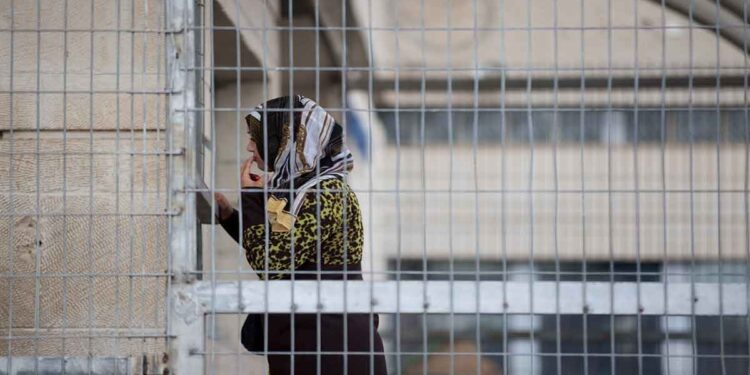The Palestinian Commission for Prisoners Affairs has said that the number of Palestinian women in Israeli prisons is currently 32, including 9 mothers.
Amongst the most prominent cases is that of Shorouk Dwaiyat, 24-years-old, currently held in Damon Prison. Dwaiyat was arrested on 7 October 2015, after being shot by a settler near al-Aqsa Mosque. The settler claimed at the time that Dwaiyat had stabbed him.
Dwaiyat was sentenced to 16 years in prison, and a fine of 80,000 shekels.
Dwaiyat is only one of the women prisoners serving arbitrarily lengthy sentences. Hers is the longest of any female prisoner.
The occupation authorities continue to detain prominent human-rights activist Khitam Saafin, 58-years-old, from Ramallah and also held in Damon prison. The occupation authorities issued an ‘administrative detention’ order against her for a period of four months.
Saafin was arrested on 2 November, 2020. Married with a son and two daughters, Saafin is a trade union activist. In 2010, she lead the Union of Palestinian Women’s Committee. She is a leading member the General Union of Palestinian Women, a member of the Regional Coalition for Women Human Rights Defenders in the Middle East and North Africa, Deputy Head of the al-Masirah International for Women, and a member of the Union of Agricultural Work Committees.
Female detainees are immediately subjected to various kinds of abuse, and even torture, by the occupation authorities, including dawn arrests, constant transfers between detention centres – and, once in prison, long-term separation from their children.
Arrests of Palestinian women have increased significantly since 2015: the number of arrests of women since that year has reached more than 1,000. They include the mothers of prisoners and martyrs, and minors, particularly in al-Quds.
The occupation practices various abuses against women, including holding them in inhumane conditions. Authorities attempt to justify such conditions, found both in individual cells and across the prison system, as due to insufficient budgets – yet women prisoners’ lives are threatened by the current state of Israel’s prison infrastructure, particularly in winter.
In those cells, female prisoners are forced to use makeshift covers when using the bathroom, while the presence of cameras is a still worse denial of their right to privacy. It is because of such indignities that women prisoners have, over the past years, employed various means to resist their detention.
As with male prisoners, women in Israeli detainees face continuous interrogation, which is often accompanied by physical and psychological torture, including: stress positions, shackling, sleep deprivation, extortion and threats, beatings – often whilst being denied access to lawyers. Solitary confinement is routinely used. Women prisoners are denied access to regular medical care, including gynaecological care.
According to the Palestinian Prisoners Society, the number of Palestinian prisoners in Israeli prisons is now 4650, including 550 prisoners with health conditions, including 10 who have cancers or tumours of varying severity.






























